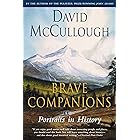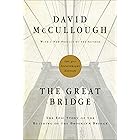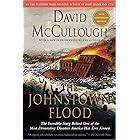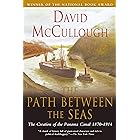| Kindle Price: | $14.99 |
| Sold by: | Simon and Schuster Digital Sales LLC Price set by seller. |
Your Memberships & Subscriptions

Download the free Kindle app and start reading Kindle books instantly on your smartphone, tablet, or computer - no Kindle device required.
Read instantly on your browser with Kindle for Web.
Using your mobile phone camera - scan the code below and download the Kindle app.

OK
 Audible sample Sample
Audible sample Sample 


The Greater Journey: Americans in Paris Kindle Edition
Not all pioneers went west.
In The Greater Journey, David McCullough tells the enthralling, inspiring—and until now, untold—story of the adventurous American artists, writers, doctors, politicians, and others who set off for Paris in the years between 1830 and 1900, hungry to learn and to excel in their work. What they achieved would profoundly alter American history.
Elizabeth Blackwell, the first female doctor in America, was one of this intrepid band. Another was Charles Sumner, whose encounters with black students at the Sorbonne inspired him to become the most powerful voice for abolition in the US Senate. Friends James Fenimore Cooper and Samuel F. B. Morse worked unrelentingly every day in Paris, Morse not only painting what would be his masterpiece, but also bringing home his momentous idea for the telegraph. Harriet Beecher Stowe traveled to Paris to escape the controversy generated by her book, Uncle Tom’s Cabin. Three of the greatest American artists ever—sculptor Augustus Saint-Gaudens, painters Mary Cassatt and John Singer Sargent—flourished in Paris, inspired by French masters.
Almost forgotten today, the heroic American ambassador Elihu Washburne bravely remained at his post through the Franco-Prussian War, the long Siege of Paris, and the nightmare of the Commune. His vivid diary account of the starvation and suffering endured by the people of Paris is published here for the first time.
Telling their stories with power and intimacy, McCullough brings us into the lives of remarkable men and women who, in Saint-Gaudens’ phrase, longed “to soar into the blue.”
- LanguageEnglish
- PublisherSimon & Schuster
- Publication dateMay 24, 2011
- File size18460 KB
Customers who bought this item also bought
Editorial Reviews
Amazon.com Review
Review
"--Kirkus Reviews" (starred review)
"McCullough's skill as a storyteller is on full display. . . . The idea of telling the story of the French cultural contribution to America through the eyes of a generation of aspiring artists, writers and doctors is inspired. . . a compelling and largely untold story in American history."
--Kevin J. Hamilton, "The Seattle Times
"
"A lively and entertaining panorama. . . . By the time he shows us the triumphant Exposition Universelle in 1889, witnessed through the eyes of such characters as painters John Singer Sargent and Robert Henri, we share McCullough's enthusiasm for the city and his affection for the many Americans who improved their lives, their talent and their nation by drinking at the fountain that was Paris."
--Michael Sims, "The Washington Post"
"There is not an uninteresting page here as one fascinating character after another is explored at a crucial stage of his development. . . . Wonderful, engaging writing full of delighting detail."
--John Barron, "Chicago Sun-Times
"
"A highly readable and entertaining travelogue of a special sort, an interdisciplinary treat from a tremendously popular Pulitzer Prize-winning historian. . . . Highly recommended."
"--Library Journal" (starred review)
"McCullough has hit the historical jackpot. . . . A colorful parade of educated, Victorian-era American travelers and their life-changing experiences in Paris."
"--Publishers Weekly" (starred review)
"An epic of ideas, as well as an exhilirating book of spells . . . This is history to be savored."
--Stacy Schiff, "The New York Times Book Review
"
"From a dazzling beginning that captures the thrill of arriving in Paris in 1830 to the dawn of the 20th century, McCullough chronicles the generations that came, saw and were conquered by Paris. . . . "The Greater Journey "will satisfy McCullough's legion of loyal fans . . . it will entice a whole new generation of Francophiles, armchair travelers and those Americans lucky enough to go to Paris before they die."
--Bruce Watson, "The San Francisco Chronicle
"
"McCullough's research is staggering to perceive, and the interpretation he lends to his material is impressive to behold. . . . Expect his latest book to ascend the best-seller lists and be given a place on the year-end best lists."
"--Booklist "(starred review)
"For more than 40 years, David McCullough has brought the past to life in books distinguished by vigorous storytelling and vivid characterizations. . . . . McCullough again finds a slighted subject in "The Greater Journey", which chronicles the adventures of Americans in Paris. . . . Wonderfully atmospheric."
--Wendy Smith, "Los Angeles Times
"
About the Author
Excerpt. © Reprinted by permission. All rights reserved.
Product details
- ASIN : B004JXXL0U
- Publisher : Simon & Schuster; Reprint edition (May 24, 2011)
- Publication date : May 24, 2011
- Language : English
- File size : 18460 KB
- Text-to-Speech : Enabled
- Screen Reader : Supported
- Enhanced typesetting : Enabled
- X-Ray : Enabled
- Word Wise : Enabled
- Sticky notes : On Kindle Scribe
- Print length : 578 pages
- Best Sellers Rank: #97,564 in Kindle Store (See Top 100 in Kindle Store)
- #10 in 19th Century World History
- #21 in History of France
- #53 in French History (Books)
- Customer Reviews:
About the authors

David McCullough has twice received the Pulitzer Prize, for Truman and John Adams, and twice received the National Book Award, for The Path Between the Seas and Mornings on Horseback; His other widely praised books are 1776, Brave Companions, The Great Bridge, and The Johnstown Flood. He has been honored with the National Book Foundation Distinguished Contribution to American Letters Award, the National Humanities Medal, and the Presidential Medal of Freedom.

BookRags.com has the largest collection of book summaries, study guides, and lesson plans online. We've got everything you need to help you study or teach over 5,000 books, poems, short stories, and plays.
Students can download comprehensive book summaries, study guides, and essays to understand the plot, key themes, important characters, and quotes of almost any story.
Teachers will save time with customizable lesson plans and creative ideas for teaching students critical thinking skills.
Customer reviews
Customer Reviews, including Product Star Ratings help customers to learn more about the product and decide whether it is the right product for them.
To calculate the overall star rating and percentage breakdown by star, we don’t use a simple average. Instead, our system considers things like how recent a review is and if the reviewer bought the item on Amazon. It also analyzed reviews to verify trustworthiness.
Learn more how customers reviews work on Amazon-
Top reviews
Top reviews from the United States
There was a problem filtering reviews right now. Please try again later.
With this book, The Greater Journey, the author has now thoroughly engaged the reader with a topic seldom written about but very deserving of study. It is only natural that we as Americans feel we live in a self centered world; after all we have 2 vast oceans that have protected our shores from invasion for several centuries, and probably will for several more. It simply does not occur to us that since our beginnings, many Americans have chosen to spend considerable time abroad, and in some cases decades of their lives.
During the 1800's and specifically from 1830 until 1900, there was a wave of intellectual migration that headed not west to America, but east to Paris, France from America. Keep in mind that we now sit in a country that is preeminent in the world, financially, intellectually, and probably culturally as well. Back then, we were just forming as a nation. The Indian wars were still in process, and the Civil War would also take place, which became the second re-creation of the United States. McCullough is totally aware of this comparison and makes wise use of it throughout this 456 page book composed of 14 distinct chapters separated into 3 parts, followed by a wonderful epilogue, and a very useful bibliography. The author understands history, and is always mindful of the relative positions of different nations. During this period we were not yet the top dog that we were to become after World War I. Europe still controlled the world's greatest universities and they were already centuries old.
If you are going to read this book in a physical format as opposed to the Kindle digital version, you are in for a treat because the paper chosen is exquisite, and the font selection is superb. If you are an older reader as I am, you will appreciate the time that was taken to design the book appropriately for readers that still relish a physically well made book, and that's what we have here.
This is the story of a 70 year period in the history of Paris, and the scores of Americans who occupied it, lived there, and helped participate in the transformation of what is called the city of light. It is also the story of scores of for want of a better word can be called expatriate Americans, although many of them did return to their native United States at different times.
McCullough is one of the few authors who truly captures the essence of an environment and then proceeds to envelop it with a reality that absorbs and perhaps even demands our attention as readers. His description of the relationship between James Fennimore Cooper and Samuel F.B. Morse and their joy in living in this magnificent city and the effects it had on their work will remain in the reader's soul for many years after the book is put back on the shelf. When Morse painted his masterpiece, it was done in Paris, and perhaps after reading this book, one realizes it could only have been done in Paris.
The city of lights already had vast boulevards, and extraordinary parks decades before the United States designed them. Indeed, New York City's Central Park which would be created later in the century would take much from Paris, and other European cities. The Americans who would go to Paris and spend years there would recall later after returning to the United States the joy of the parks, the energy of the city itself and the sheer unequalled cultural delights that embodied Paris. Visually we can still see much of this in the work of the Impressionist School of painting.
I found the author's handling of Mary Cassatt, who was a Philadelphia born daughter of American socialites who went on to be an illustrious painter as a principal part of the Impressionist school, to be particularly well done. Her relationship to Edgar Degas the renowned painter of the ballet and horses, as well as landscaping is thoroughly chronicled in the book. McCullough's ability to weave life into life, with Paris as the focal point constantly holding the book together in such a way that the reader feels compelled to continue to read, not pausing to eat is what in the end keeps the author at the pinnacle of his profession today.
It is obvious that this book was a labor of love for the author. It comes shining through with the admiration that McCullough holds for both Oliver Wendell Homes the American medical student in Paris, and Ralph Waldo Emerson, a name we all recognize. He even takes the time to take us through the time that Mark Twain spent in this wonderful city.
Not only was Paris transformed by the Americans that occupied it during this century, but Paris itself went through extraordinary changes and development. Kings re-invented the city several times during this century. Vast numbers of poor were displaced and sent to the country. It was invaded during this period as well. Later vast tree lined streets and boulevards would be created that became the envy of Europe. The Louvre would be increased in size enormously in an attempt to make it the most important museum on the entire continent, and France would succeed in this effort.
McCullough intertwines the story of Paris, its growth, its impact on the Americans and what the Americans brought back to America as a result, into a book in such an imaginative way that the reader will find himself revisiting this book from time to time. In the end the book is riveting, and this is a phrase I find myself continuing to use every time I pick up a book written by this author.
Many lives are captured in this masterpiece. They include George Healy the portrait painter, Nathaniel Hawthorne whose writings still continue to occupy many a college freshman's late nights, and future American Senator Charles Sumner who would have his views on slavery refined while living in Paris. Indeed he became an abolitionist as a result of his Parisian experience.
CONCLUSION:
Prior to reading The Greater Journey, I believed I had a good understanding of 19th century Paris. Having studied the art of that period, going to the Louvre, and sitting in on lectures dealing with Paris in the 1800's, I looked forward to seeing what this author could add to the story. I did not expect what I got, which was to have him blow away my understanding and replace it with something that came alive and stood on many different legs of understanding, but isn't that what great writing can do. It can simply make things come alive again. You feel as though you are there, and McCullough puts us right there in the thick of the action.
Although it is not the whole story, if you have any interest at all in understanding the transformative art period that was the Impressionist movement it is vividly captured here in the lives of Augustus Saint-Gaudens with John Singer Sargent, and Mary Cassatt. David McCullough is already an acclaimed author with two Pulitzers and two national Book Awards, and it looks like with this book, he's got another Pulitzer coming down the pike. Thank you for reading this review.
Richard C. Stoyeck
Many books have been written about the original Franco-American relations after the Revolutionary war (Jefferson, B. Franklin, etc...) . Also, most people are familiar with the 20th century iconic Americans that paid a visit to the City of Lights (Heminway, Gertrude Stein or Scott Fitzgerald.). But the period covered in McCullough's book is a little more obscure even though it is by no means less important. It's the time of the American Civil War and the Third Republic in France, the time of Abolitionism and the Commune. These were tumultuous times by any standard and it is simply amazing to read about the talented people that risked everything not only for personal glory but to bring back to America culture and new ideas.
For some reason the first three chapters of this book are a bit hard to get through however. These chapters deal will writers like Fenimore Cooper and doctors like Wendell Holmes. But by chapter five I wasn't able to put it down. First, the book has a nice way of weaving the stories of all the characters involved and follow them across time and historical events. Secondly, the biographies of these Americans were indeed interesting, even exceptional. Who knew Morse was a very talented painter before going on to invent the telegraph for example? That the first american female doctor graduated in Paris. Painters like George Healy, O. Tanner, Beckwith, Singer Sargent and Mary Cassatt. Sculptors like Saint-Gaudens. Politicians like Sumner and Wishburne. The American colony in Paris grew and was tested at times by the various upheavals that shook France and the US, the Franco-Prussia war and La Commune being probably the most dramatic and violent fro the french residents but also, of course, the American Civil War.
McCullough is a good writer in that he is able to convey not only the facts but also delves into the difficulties, heroism, and even moods of the people he writes about by researching their correspondence and documents. I recently read a book that would be the perfect companion to McCullough's but from the perspective of french painters: "The Judgement of Paris" . As a painter myself, I found interesting to know that both Manet and Wishburne were both inside Paris during Bismarck's siege, that Singer Sargent and many other American painters were competing with the likes of Meissionier and the group that would eventually become the "Impressionists" for medals in the Salon. But also the conditions in which artists worked and studied in France would interest any art student today and put things in perspective as to what being an artist meant and means today.
The statue of Liberty, the Tower Eiffel, the Smithsonian Institute , many monuments and museums that adorn American Cities, ideas about science and politics, art collections and emblematic artworks... they all make an appearance, step down from their pedestal and become alive , controversial and relevant once more.
Top reviews from other countries
With “The Greater Journey” David McCullough has brought us another great century of American history. This time he follows the journey of ex-pats living in Paris, the center of civilization. They were there on a mission to learn and better themselves in order to help their new nation advance. There are so many stories and characters that when I picked up the book it was a bit intimidating. However, this book turned out to be a page turner, as the author masterfully intertwines all these stories into a beautiful work of art and history.
And David McCullough knows about art. The book has a quite a few pictures of art works produced in this era by masters such as Morse, Healy, St. Gaudens, Sargant, and Cassat. The descriptions of these works and the creative process they went through is simply excellent. The bibliography alone is over one hundred pages.
Furthermore, this book beyond the individual stories of its characters also brings to light the history of Paris in the 19th century. From revolutions, and violence, and war, to an age of enlightenment, and prosperity, finishing with the Belle Époque.
I would highly recommend this book as good reading to be savored and cherished. The sacrifices that these generations of Americans went through in pursuit of knowledge and artistic growth are truly inspirational.











